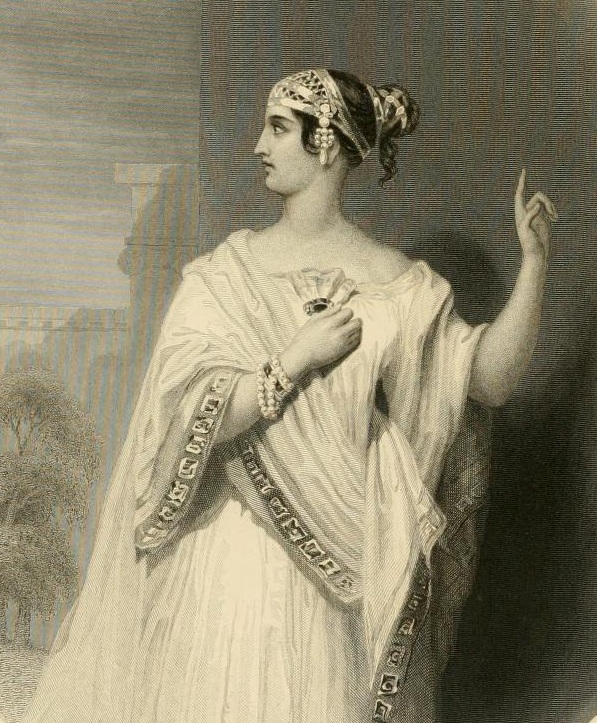The Shakespeare Sisterhood: Portia
This lady, daughter of Cato, and wife of Marcus Brutus, is introduced with grateful effect in the tragedy of Julius Caesar,
affording relief, by her truly feminine presence, to that painful
record of "treason, stratagems," and foul conspiracy.
Portia is the just impersonation of a matron "after the high Roman fashion," -- carefully finished, and severely classic in its lightest
touches. Full of sensibility, tenderness, and all the timid flutterings of her sex, she yet entertains lofty ideas of the heroic fortitude, severe virtues, and unflinching nerve that become "Cato's
daughter," and "the woman that Lord Brutus took to wife;" and
in her unavailing self-discipline to attain those stoical perfections,
she presents one more example of the ineffectuality of the "schools" to divert the natural bent of the female character.
"For the picture of this wedded couple, at once august and tender," says Campbell, "human nature, and the dignity of conjugal faith, are indebted;" it is almost the only instance, among all of Shakespeare's married people, in which, long after the honeymoon
has departed, the wife is neither the master, slave, nor pretty toy
of her husband:
Bru. Portia, what mean you? Wherefore rise you now?
It is not for your health, thus to commit
Your weak condition to the raw-cold morning.
Por. Nor for yours neither. You have ungently, Brutus,
Stole from my hed. And yesternight, at supper,
You suddenly arose, and walked about,
Musing, and sighing, with your arms across;
And when I ask'd you what the matter was,
You star'd upon me with ungentle looks.
I urged you further; then you scratch'd your head,
And too impatiently stamp'd with your foot;
Yet I insisted, yet you answer'd not --
But, with an angry wafture of your hand,
Gave sign for me to leave, you: So I did.
* * * * * * Dear my lord,
Make me acquainted with your cause of grief.
Bru. I am not well in health, and that is all.
Por. Brutus is wise; and, were he not in health,
He would embrace the means to come by it.
Bru. Why, so I do. -- Good Portia, go to bed.
Por.* * * * * * No, my Brutus;
You have some sick offence within your mind,
Which, by the right and virtue of my place,
I ought to know of: And, upon my knees,
I charm you, by my once commended beauty,
By all your vows of love, and that great vow
Which did incorporate and make us one,
That you unfold to me, yourself, your half,
Why you are heavy. * * * * * *
Bru. Kneel not, gentle Portia.
Por. I should not need, if you were gentle Brutus.
Within the bond of marriage, tell me, Brutus,
Is it excepted I should know no secrets
That appertain to you? Am I yourself
But, as it were, in sort, or limitation --
To keep with you at meals, comfort your bed,
And talk to you sometimes? Dwell I but in the suburbs
Of your good pleasure? If it be no more,
Portia is Brutus' harlot, not his wife.
Bru. You are my true and honorable wife,
As dear to me as are the ruddy drops
That visit my sad heart.
Por. If this were true, then should I know this secret.
I grant I am a woman -- but, withal,
A woman that Lord Brutus took to wife;
I grant I am a woman -- but, withal,
A woman well reputed -- Cato's daughter.
Think you I am no stronger than my sex,
Being so father'd, and so husbanded?
Tell me your counsels -- I will not disclose them:
I have made strong proof of my constancy,
I Giving myself a voluntary wound,
Here, in the thigh. Can I bear that with patience,
And not my husband's secrets?
Bru. O ye gods,
Render me worthy of this noble wife!--
Hark! hark! one knocks: Portia, go in awhile;
And by and by thy bosom shall partake
The secrets of my heart.
All my engagements I will construe to thee.
How to cite this article:
Palmer, Henrietta L. The Stratford gallery, or, The Shakespeare sisterhood. New York: D. Appleton and Co., 1859. Shakespeare Online. 20 Oct. 2009. (date when you accessed the information) < http://www.shakespeare-online.com/plays/characters/sisterhoodportia.html >.
___________
Related Articles
 Julius Caesar Overview Julius Caesar Overview
 Julius Caesar Summary (Acts 1 and 2) Julius Caesar Summary (Acts 1 and 2)
 Julius Caesar Summary (Acts 3 and 4) Julius Caesar Summary (Acts 3 and 4)
 Julius Caesar Summary (Act 5) Julius Caesar Summary (Act 5)
 Blank Verse and Diction in Julius Caesar Blank Verse and Diction in Julius Caesar
 Julius Caesar Character Introduction Julius Caesar Character Introduction
 Julius Caesar: Analysis by Act and Scene (and Timeline) Julius Caesar: Analysis by Act and Scene (and Timeline)
 Julius Caesar Study Questions (with Detailed Answers) Julius Caesar Study Questions (with Detailed Answers)
 Julius Caesar Quotations (Top 10) Julius Caesar Quotations (Top 10)
 Julius Caesar Quotations (Full) Julius Caesar Quotations (Full)
 All About Et tu, Brute? All About Et tu, Brute?
 How to Pronounce the Names in Julius Caesar How to Pronounce the Names in Julius Caesar
 Sources for Julius Caesar: Important Excerpts from Plutarch Sources for Julius Caesar: Important Excerpts from Plutarch
 From History to the Stage: An Account of Shakespeare's Adaptation of Plutarch's Julius Caesar From History to the Stage: An Account of Shakespeare's Adaptation of Plutarch's Julius Caesar
 Plutarch's Influence on Shakespeare and Other Writers of the Sixteenth Century Plutarch's Influence on Shakespeare and Other Writers of the Sixteenth Century
|
Previous: Beatrice Next: Miranda

|
